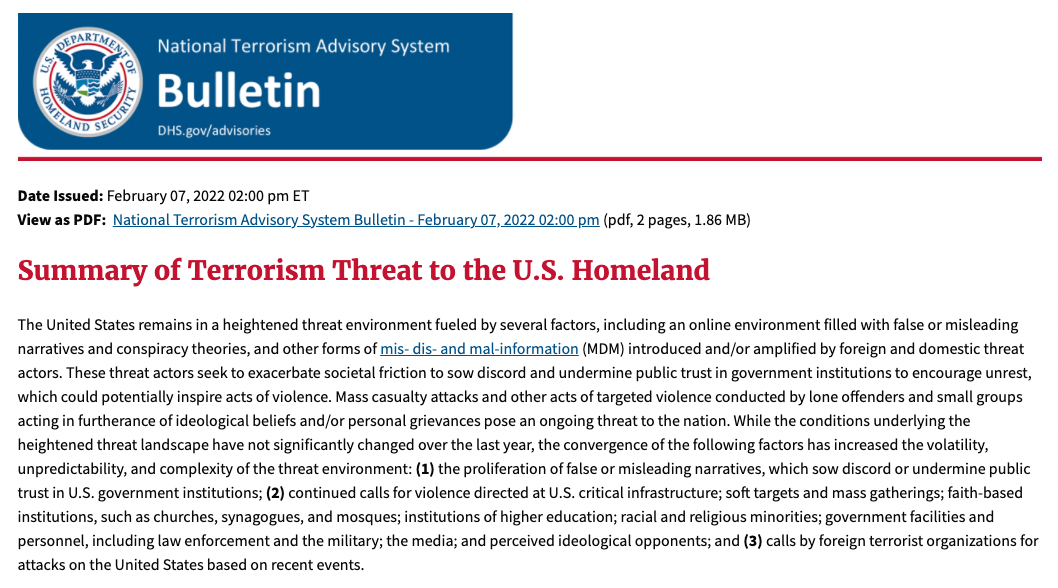|
Can speech be considered a form of terrorism?
On Feb. 7, the Department of Homeland Security posted a bulletin asserting that efforts to “undermine public trust in government institutions” through so-called “mis- dis- and mal-information” can be considered a form of domestic terrorism. This nugget was contained in a letter three Republican members of the House Judiciary Committee sent today to Matthew Olsen, who heads the Department of Justice National Security Division (NSD), asking for records of internal debate over the creation of a new domestic terrorism office. “Under the Biden Administration … the Department and the White House have used the heavy hand of federal law enforcement – including counterterrorism resources – to target concerned parents at local school board meetings and chill their protected First Amendment activity,” wrote Ranking Member Jim Jordan (R-OH), Rep. Mike Johnson (R-LA) and Rep. Andy Biggs (R-AZ). The three congressmen wrote that “career Department attorneys warned that ‘it is unnecessary and potentially harmful to establish a dedicated domestic terrorism in CTS.’ The career attorneys also warned that ‘[a]rtificially splitting CTS into separate domestic and international terrorism offices would weaken the broad expertise currently housed in CTS, reduce synergy in our counterterrorism effects, and deny our attorneys the benefits of cross-pollination.” The three congressmen cited the Biden Administration’s directive to use “the heavy hand of federal law enforcement – including counterterrorism resources – to target concerned parents at local school board meetings and chill their protected First Amendment activities.” There are signs that the FBI is pulling back, with Jill Sanborn, executive assistant director of the FBI National Security Branch, recently saying in Senate testimony that the Biden Administration initiative on investigating angry parents at school boards is “not a particular focus for the counterterrorism division.” To be fair, the expression of truly extreme beliefs can provide reasonable cause for counterterrorism officers to track someone as a potential terrorist. But the push back of practitioners shows that the current administration’s lens on extremism is blurred at best. Who is a purveyor of “mis- dis and mal-information” in a way that undermines public trust in government? MSNBC’s Rachel Maddow? Fox News’ Tucker Carlson? Parents upset about a local mask mandate? You might find one or all of them to be overbearing or misinformed, but should they be treated as “terrorists”? Not only does this wide approach threaten to criminalize speech. It also dilutes the ability of counterterrorist experts to focus on the real threats to the homeland. The letter from Jordan, Biggs and Johnson will render a great service if it reveals that counterterror practitioners are concerned that the usual First Amendment guardrails are absent from the administration’s domestic counterterrorism policies. Comments are closed.
|
Categories
All
|


 RSS Feed
RSS Feed